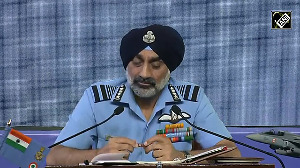The much-awaited approval of the legislation by the United States Congress allowing civilian nuclear trade with India for the first time in 30 years has not given enough reason for some Indian scientists to welcome it without reservation.
While the government response remains cautious but unmistakably positive, the critics' earlier opposition to the deal remains unchanged.
Dr A N Prasad, former chief of the Bhabha Atomic Research Centre, told rediff.com: "I find that many of the provisions which go beyond the July 18 joint statement and the separation plan still remain intact."
"To sell the version at this stage, the US negotiators are meddling with the language to couch the main areas of concern and are packaging them by characterising some of the issues as legally non-binding. There is an inherent danger in buying such arguments unless they can be explicitly spelt out clause by clause and formally agreed," he added.
He, the Bharatiya Janata Party, Left parties and a group of senior nuclear scientists have begun furiously campaigning against the deal, maintaining that their earlier apprehensions over the deal remain valid even today.
India's official response, however, has been deliberately cautious, though it leaves no one in doubt about the government's firm determination to go ahead with the deal no matter what the Opposition's misgivings and criticism.
As External Affairs Ministry spokesman Navtej Sarna stated on Friday with an uncharacteristic note of enthusiasm: "The enactment of the waiver has wider implications for India's access to international cooperation in civilian nuclear energy and is, therefore, of historic significance."
Prime Minister Manmohan Singh has carefully refrained from articulating on the subject. Official sources maintain that this is the correct approach given the fact that a full-time external affairs minister is now available, and, secondly, since Parliament is currently in session.
Clearly, it will be External Affairs Minister Pranab Mukherjee who will be holding fort on the floor of Parliament on the subject in the coming days while the government strains to steer through what is certain to be a turbulent week ahead.
Mukherjee will be called upon to defend the government's stance against the benchmarks set by Dr Singh in his August 2006 speech. This may prove an onerous task.
When the US Senate passed the bill in November, Mukherjee himself went on record that the defining moment will arrive when the reconciled version of the bill became available. That moment has now arrived.
But government sources are, on the other hand, at pains now to shift the defining moment to a still future date when the inter-governmental 123 agreement takes shape. The million dollar question is whether the BJP and the Left parties would acquiesce with such an explanation at this juncture. Equally, Mukherjee will have a particularly difficult time answering some of the considered opinions of the country's scientific community.
Dr A Gopalakrishnan, former chairman of the Atomic Energy Regulatory Board, has been scathing in his criticism. He told rediff.com: "No notable improvements have been made in the final version of the bill."
Gopalakrishnan pointed out that while the chairman of the Indian Atomic Energy Commission had unequivocally rejected Section-115 in the earlier version, it is still retained as Section-109 in the final version.
Dr Prasad summed up: "There is no place for euphoria at this stage as the bill amply demonstrates where the US interests lie between cooperation on the one hand and non-proliferation and capping of our strategic capability on the other."





